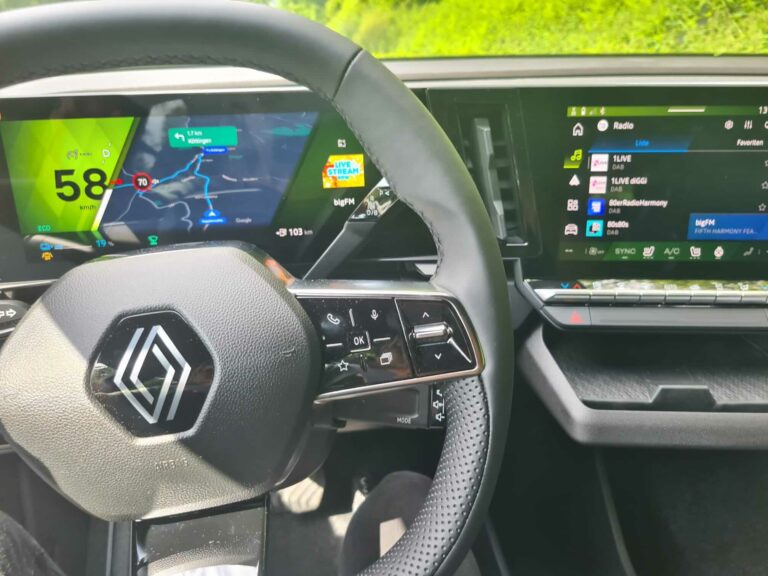How to Use the German Verb “Sein”
If you want to share your feelings, rave about how awesome your friends are, vent about your new boss’s terrible traits, or describe the charming café you just discovered, mastering the German verb “sein” is a must!
The verb “sein” undeniably holds the title of the most important verb in German. You’ll need it to build even the simplest German sentences. It is used extensively both as a main verb and as an auxiliary verb.
Whether discussing past events, navigating present circumstances, planning future endeavors, or weaving hypothetical scenarios, the verb “sein” always tags along on your epic quest to conquer the German language.
Let’s jump right in and uncover the captivating world of the German verb “sein”!
“Sein” in the Present Tense (Präsens)
When talking about your current feelings or your state of mind, when describing objects or people, or when talking about locations, you will need to use the verb “sein” in the present tense.
Ich bin müde. (I am tired.)
Sie ist verwirrt. (She is confused.)
Wir sind verzweifelt. (We are desperate.)
Bist du enttäuscht? (Are you disappointed?)
Peter ist groß. (Peter ist tall.)
Der Rock ist ziemlich kurz. (The skirt is pretty short.)
Wir sind mitten in der Stadt. (We are in the middle of the city.)

Let’s take a look at how to conjugate sein in the present tense. You’ll need to memorize these conjugations.
| Präsens | |
| ich | bin |
| du | bist |
| er/sie/es | ist |
| wir | sind |
| ihr | seid |
| sie, Sie | sind |
“Sein” in the Simple Past (Präteritum)
“Sein” is used a lot in the simple past when you talk about the past, both in spoken and in written language. If you want to describe how things were in the past or how someone was feeling in the past, these conjugations will come in handy.
Let’s take a look at some simple sentences:
Er war gestern nicht zu Hause. (He was not at home yesterday.)
Wir waren schlecht gelaunt. (We were in a bad mood.)
Waren sie gestern in der Schule? (Were they at school yesterday?)
Wer war am Samstag beim Training? (Who was at practice Saturday?)
The following conjugation table shows you the different conjugations of “sein” in the preterite tense.
| Präteritum | |
| ich | war |
| du | warst |
| er/sie/es | war |
| wir | waren |
| ihr | wart |
| sie, Sie | waren |
If you want to listen to the conjugation of “sein” in the simple past and hear it being used in some useful example sentences, check out this video:
“Sein” in the Present Perfect (Perfekt)
The present perfect tense is commonly used in spoken German and in informal writing to express actions that have been completed in the past. It is formed with the auxiliary verb “haben” or “sein” (to have or to be) in the present tense, followed by the past participle of the main verb.
Er ist drei Wochen in Berlin gewesen. → He was in Berlin for three weeks.
Wir sind den ganzen Tag am Strand gewesen. → We were at the beach the whole day.
Ich bin noch nie in Deutschland gewesen. → I have never been to Germany before.
Bist du schon mal am Nürburgring gewesen? → Have you ever been to Nürburgring?

For verbs of movement, you will need to use the the auxiliary verb “sein”. Here is what the different verb forms look like with “sein” being both the auxiliary verb and the main verb:
| Present Perfect Tense with the Verb Sein Being Both the Auxiliary Verb and the Main Verb | |
| ich | bin gewesen |
| du | bist gewesen |
| er/sie/es | ist gewesen |
| wir | sind gewesen |
| ihr | seid gewesen |
| sie, Sie | sind gewesen |
In English, the past participle “gewesen” correponds to “been”. “Ich bin gewesen” therefore has the literal translation “I have been”.
In the video below, you’ll find many more examples of the verb “sein” used in the perfect tense and how to structure German sentences using it. What’s more, you can practice your listening and pronunciation skills at the same time.
Here is what the different verb forms look like with “sein” as the helping verb and a different main verb:
| Present Perfect Tense with the Verb Sein Being the Auxiliary Verb and Gehen Being the Main Verb | |
| ich | bin gegangen |
| du | bist gegangen |
| er/sie/es | ist gegangen |
| wir | sind gegangen |
| ihr | seid gegangen |
| sie, Sie | sind gegangen |
Here are a few examples:
Gestern bin ich zu Fuß zur Arbeit gegangen. (Yesterday, I walked to work.)
Jenny ist nach Hause gegangen. (Jenny went home.)
“Sein” in the Imperative (Imperativ)
We use the imperative on a daily basis, just like in the English language. It is used to give instructions or orders and can be used both in a business and private context. Here are some examples:
Bitte sei pünktlich! (Please be on time!)
Bitte sei lieb! (Please be good! – this is something you would say to a child or pet)
Bitte seid leise! (Please be quiet you guys!)
Seid nicht so stur! (Don’t be so stubborn you guys!)
“Sein” in the Future I Tense (Futur I)
It’s quite simple to form the future tense in the German language. You simply need the verb “werden” as an auxiliary verb and the infinitive of the main verb. “Sein” is used a lot as an infinitive in the future tense. Let’s take a look at a few examples:
Er wird enttäuscht sein! (He will be disappointed!)
Ich werde am Abend müde sein. (I will be tired in the evening.)
Du wirst erleichtert sein! (You will be relieved!)
Wir werden überfordert sein. (We will be overwhelmed.)

“Sein” in the Future II Tense (Futur II)
The Future II tense in German is formed by using the auxiliary verb “werden” (to become) in its conjugated form, followed by the past participle of the main verb and the verb “sein” or “haben” in the infinitive.
- Future II is used to express actions that will have been completed by a certain point in the future. (There must always be a time indication here to clarify that it concerns the future).
- Future II is also used to speculate about an action in the past.
Here’s how the future II tense is used in a few example sentences:
Sie wird bis morgen Abend angekommen sein. (She will have arrived by tomorrow night.)
Wir werden am Sonntagnachmittag in Barcelona gelandet sein. (We will have landed in Barcelona on Sunday afternoon.)
Er wird nicht nach Hause gefahren sein. (He will not have driven home.)
Toni und Samira werden nicht in die Bar gegangen sein. (Toni and Samira will not have gone to the bar.)
“Sein” in the Subjunctive Present (Konjunktiv II in der Gegenwart)
When you make hypothetical statements or talk about your wishes or things that could happen in the future, you would use the subjunctive present (Konjunktiv II in der Gegenwart).
As we know, “sein” is an irregular verb, so you will also need to learn the subjunctive present forms by heart.
| Konjunktiv II in der Gegenwart | |
| ich | wäre |
| du | wärst |
| er/sie/es | wäre |
| wir | wären |
| ihr | wärt |
| sie, Sie | wären |
This is how this mood is used in sentences:
Ich wäre gerne Pilotin. (I would like to be a [female] pilot.)
Wärst du gerne größer? (Would you like to be taller?)
Ich wäre jetzt gerne bei dir. (I would like to be with you right now.)
Kathrin wäre jetzt am Strand, wenn ihr Bruder keinen Unfall gehabt hätte. (Kathrin would be at the beach right now if her brother hadn’t had an accident.)

“Sein” in the Subjunctive Past (Konjunktiv II in der Vergangenheit)
When you talk about things that could have been, you use the Subjunctive Past in German (Konjunktiv II in der Vergangenheit). It refers to actions that will never come true. To form this structure, you need to use the verb “sein” in the Subjunctive Present forms and add a past participle.
| Konjunktiv II in der Gegenwart with Sein Being Both the Auxiliary Verb and the Main Verb | |
| ich | wäre gewesen |
| du | wärst gewesen |
| er/sie/es | wäre gewesen |
| wir | wären gewesen |
| ihr | wärt gewesen |
| sie, Sie | wären gewesen |
This is how this mood is used in sentences:
Ich wäre gerne bei dir gewesen. (I would have liked to be with you.)
Wärst du gerne mit uns gekommen? (Would you have liked to come with us?)
Wenn es nicht geregnet hätte, wären wir im Freibad gewesen. (If it hadn’t rained, we would have been at the outdoor pool.)
Mir wäre nicht schlecht gewesen, wenn das Essen nicht verdorben gewesen wäre. (I wouldn’t have been nauseous if the food hadn’t been spoiled.)
You can also use a different main verb. Let’s take a look at the verb forms with aufstehen being the main verb. The past participle of aufstehen is aufgestanden:
| Konjunktiv II in der Gegenwart with Sein Being the Auxiliary Verb and Aufstehen Being the Main Verb | |
| ich | wäre aufgestanden |
| du | wärst aufgestanden |
| er/sie/es | wäre aufgestanden |
| wir | wären aufgestanden |
| ihr | wärt aufgestanden |
| sie, Sie | wären aufgestanden |
Wenn du mich geweckt hättest, wäre ich früher aufgestanden. (If you had woken me up, I would have gotten up sooner.)
Er wäre nicht aufgestanden, wenn er gewusst hätte, dass es regnet. (He wouldn’t have gotten up if he had known that it was raining.)
“Sein” in the Infinitive Form (Infinitiv)
The English infinitive “to be” translates to “sein” in German. We already learned that if you want to talk about the future, you need to conjugate the verb “werden” and use it together with an infinitive. Oftentimes, this infinitive is sein. Let’s see how it works in the following examples:
Sie wird schneller sein als ich. (She will be faster than me.)
In combination with modal verbs, the infinitive “sein” is frequently used. Let’s take a look at a few examples:
Du musst leise sein! (You have to be quiet!)
Wir dürfen nicht hier sein! (We are not allowed to be here!)
Könntest du bitte geduldig sein? (Could you please be patient?)

Using “Sein” to Specify Details
In order to tell time in German, you also need to use “sein”.
Es ist schon 20 Uhr. (It is already 8pm.)
Wie viel Uhr ist es? (What time is it?) You can also say: Wie spät ist es? (Literally: How late is it?)
When talking about someone’s age, you will need to use “sein” as well.
Er ist acht Jahre alt. (He is eight years old.)
Wie alt sind Sie? (How old are you? – formal)
Sie ist noch jung. (She is still young.)
When talking about dates, months, and week days, the German verb “sein” is also indispensable.
Bald ist Mai. (Literally: Soon is May.)
Heute ist Montag. (Today is Monday.)
Morgen ist der 5. Juni. (It’s June 5th tomorrow.)
Final Thoughts
The verb “sein” is undeniably one of the most important German verbs. You will need it to express your emotions, to describe people and things, to talk about professions, locations, time, and to make hypothetical statements.
Since the German verb “sein” is an irregular verb, you won’t have much of a choice but to memorize all of its conjugated forms across the various verb tenses.
You can help yourself by taking a look at how “sein” is used in examples and in German texts and try to write sentences of your own. You can also practice using “sein” and other German verbs in our app where you have the chance to download worksheets, complete quizzes, and listen to native speakers use “sein” in our podcasts.







